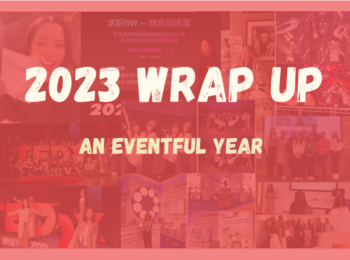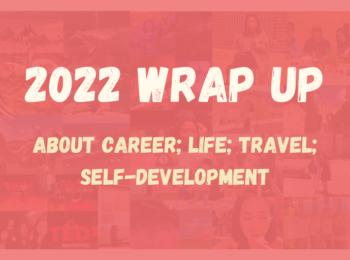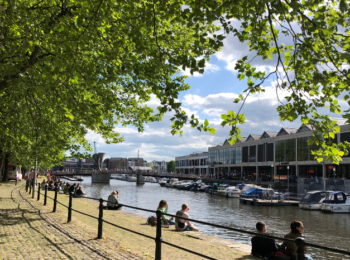
Moon (2000) states that reflection is a complicated thinking process of considering different elements in more detail in order to achieve a useful outcome. There are two types of reflective thinking including reflection on action and reflection in action (Kline, 2013). Reflection on action refers to recalling and analysing professional situations (Russell and Munby, 1992) while reflection in action means applying these reflections to guide the action in challenging situations (Argyris et al., 1985).
Therefore, in this reflection, I will consider the blog making process in detail, critically analyse the strengths and weaknesses of the process of blog making, which is reflecting on action. Furthermore, I will summarise the vital experience as a support for strategy making and blog development, which is reflecting in action.
According to Kolb (1984), there are 4 stages in reflective practice as follows:
(1) have personal experience
(2) critically review the experience and learn from it
(3) summarize and conceptualize the experience
(4) use the reflection and experience to map out the next plan

The blog is set as a theme of “study abroad” with the purpose of providing support for overseas students. “Content is the king” (Graham et al., 2015).

Firstly, I made small market research by creating an Instagram story to ask what are the challenges they have encountered when studying abroad? (Appendix 1) After getting the answers, I summarized the challenges and made a content strategy based on 3 main areas including language, campus study and social life. Then I mapped out the wireframe of the blog, plugged in marketing tools and set up a marketing plan for the blog as shown in (Appendix 2).

Secondly, the whole process of creating the blog is multitasking but interesting. At first, the marketing channel was one-dimensional only in Instagram stories. However, I decided to do marketing in multichannel, including Facebook and LinkedIn, after analysing the stats performance (Appendix3 matrix analysis).



This made me so surprised that the Lincoln International Business School (LIBS), Events Management program leader and Chinese office of the university contacted me after reading my post and asked if it could be a promotion for the University of Lincoln (Appendix 4). Therefore, it is vital to maximize the value of each post through sharing it in multiple platforms because the audience is slightly different and will read the post from different perspectives.
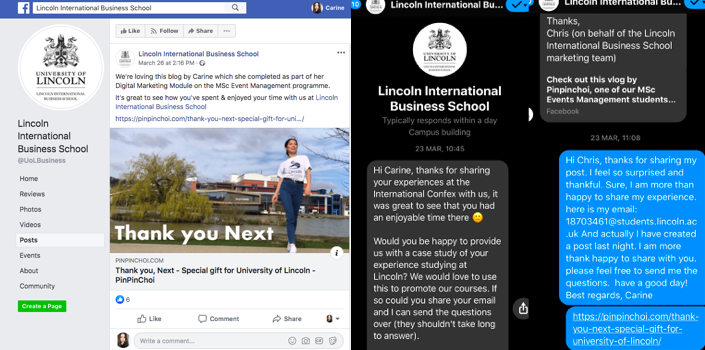
What is more, time management plays an important role in the process. In particular, scheduling the preparation of content and frequency of promotion contributes greatly to the post-performance and consistency.

What I have learnt
The most important thing about what I have learnt from this blog is sharing. I did not expect my experience would have such a great impact. In the era of knowledge-sharing, it is meaningful to share ways to overcome difficulties and giving them support through contributing personal experience integrated with academic literature.
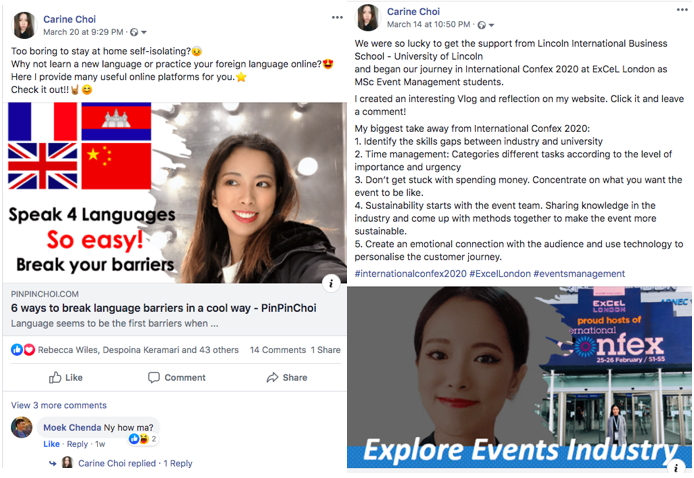
Besides, learning by doing is essential to personal development. I found it difficult to plug in the social media and SEO setting at first and then I went to Google and YouTube for the guidance. I have enhanced my digital marketing skills through different platforms such as Google and HubSpot.
What I could have done better
is the marketing strategy. I did not make sufficient market research on the target audience and marketing channels effectiveness. That is to say, the sample size of the research audience was limited while the marketing channel was one-dimensional in the beginning. Furthermore, the wireframe of the blog could be more unique and creative, as I spent more time on content while less on design within a limited time.
Finally, the future plan supported by the experience and reflection mentioned before is made as follows:
- Research larger scale audience to explore more interesting topics
- “Content is king”: continue to write valuable content for target audience based on the market research and share my experience with the audience
- Make a sufficient marketing strategy based on the literature and different channels performance report as well as using effective marketing management tools such as Hootsuite
- Spend more time on design and make the outline more creative
- Potential business-to-business and business-to-customer development. It has the potential to cooperate with relevant educational organizations or be a consultant for overseas students.
- Diversification is one of the important ways of strategy making (Gamble et al., 2017). As my career goes, I could diversify my website and add “work overseas” topic in my blog, which could develop my personal portfolio as well as increase business-to-business and business-to-customer cooperation opportunities.
Appendices would be in the Word submitted to the Turnitin.
Reference:
Argyris, C., Putnam, R., and Smith, D. M. (1985) Action science: Concepts, methods, and skills for research and intervention. San Francisco, CA: Jossey-Bass.
Fergusson, L., Van der Laan, L. and Baker, S. (2019) Reflective practice and work-based research: A description of micro- and macro-reflective cycles. Reflective Practice, 20(2) 289-303. Available at https://www-tandfonline-com.proxy.library.lincoln.ac.uk/doi/pdf/10.1080/14623943.2019.1591945?needAccess=true[accessed 3 April 2020]
Graham, G., Vargo, C. J., Shaw, D. and Greenhill, A. (2015) Content is king: news media management in the digital age [ebook]. New York: Bloomsbury Academic. Available at https://eds-a-ebscohost-com.proxy.library.lincoln.ac.uk/eds/detail/detail?vid=0&sid=ccee1233-0b96-4f9f-ab02-ea2ef4d378b3%40sdc-v-sessmgr02&bdata=JnNpdGU9ZWRzLWxpdmUmc2NvcGU9c2l0ZQ%3d%3d#AN=1052665&db=e020mww [accessed 3 April 2020]
Kline, K. A. (2013). Reflection in Action: A Guidebook for Student Affairs Professionals and Teaching Faculty [ebook]. Sterling, Va: Stylus Publishing. Available from: https://web-a-ebscohost-com.proxy.library.lincoln.ac.uk/ehost/ebookviewer/ebook/bmxlYmtfXzY3NTI3N19fQU41?sid=df70e1c0-e917-457d-8cc8-e4f3b9dd3735@sdc-v-sessmgr01&vid=0&format=EK&rid=1[accessed 3 April 2020]
Kolb, D. A. (1984). Experiential learning: Experience as a source of learning and development. New Jersey: Prentice Hall.
Moon, J. A. (2000) Reflection in learning & professional development: theory & practice [ebook]. London; New York: Routledge Falmer. Available from https://www-dawsonera-com.proxy.library.lincoln.ac.uk/abstract/9780203822296 [accessed 3 April 2020]
Russell, T., and Munby, H. (1992). Teachers and teaching: From classrooms to reflection. New York: Falmer Press.


